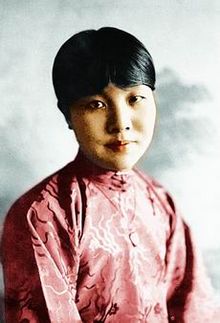Bing Xin (Xie Wanying) | |
|---|---|
 Bing Xin in the 1920s. | |
| Born | 5 October 1900 |
| Died | 28 February 1999 (aged 98) |
| Alma mater | Yenching University,Wellesley College |
| Spouse | Wu Wenzao |
| Children | Wu Qing |
| Parent(s) | Xie Baozhang (謝葆璋) Yang Fuci (楊福慈) |
| Awards | 1998 Lu Xun Literary Prize |
| Bing Xin | |||||||||||
|---|---|---|---|---|---|---|---|---|---|---|---|
| Chinese | 冰心 | ||||||||||
| Literal meaning | "Ice Heart" | ||||||||||
| |||||||||||
| Xie Wanying | |||||||
|---|---|---|---|---|---|---|---|
| Traditional Chinese | 謝婉瑩 | ||||||
| Simplified Chinese | 谢婉莹 | ||||||
| |||||||
Xie Wanying (simplified Chinese: 谢婉莹; traditional Chinese: 謝婉瑩; October 5, 1900 – February 28, 1999),[1] better known by her pen name Bing Xin (Chinese: 冰心) or Xie Bingxin, was one of the most prolific Chinese women writers of the 20th century. Many of her works were written for young readers. She was the chairperson of the China Federation of Literary and Art Circles. Her pen name Bing Xin (literally "Ice Heart") carries the meaning of a morally pure heart, and is taken from a line in a Tang dynasty poem by Wang Changling.[2]
Bing Xin published her first prose in the Morning Post (Chinese: 晨報) The Impressions of the 21st Hearing and her first novel Two Families in August 1919.[citation needed] Before and after studying abroad in 1923, she began to publish prose letters Jixiaoduzhe (To Young Readers; Chinese: 寄小讀者), which became a foundation stone of Chinese children's literature.[3] Bing Xin was hired by the University of Tokyo as the first foreign female lecturer to teach a Chinese New Literature course. She returned to China in 1951.[4]
- ^ "Bingxin | Chinese author". Encyclopedia Britannica. Retrieved 2017-10-19.
- ^ 谌, 许业 (2005). "《王昌龄与芙蓉楼》". 《档案时空》. 1: 42.
- ^ Cite error: The named reference
:0was invoked but never defined (see the help page). - ^ Cite error: The named reference
:1was invoked but never defined (see the help page).